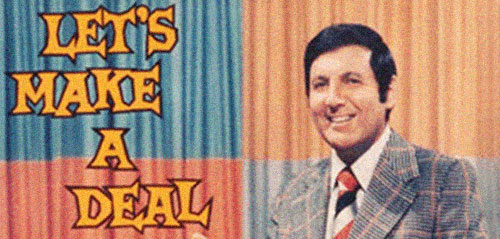
The following letter was sent to me in response to my column in Scientific American (which generated hundreds of letters in response, so I penned the following response) in which I discussed the now-infamous (and infuriatingly counter-intuitive) probability problem called the Monty Hall Problem, or the Three Door Problem, in which a contestant chooses one of three doors, behind one of which is a car and the other two goats. Monty then reveals what’s behind one of the other doors (only ever showing a goat and never showing you your own door pick), which is always a goat, then asks if you want to change doors. Most people say it doesn’t matter because now it’s 50/50, but the correct answer is that you should always switch, which will give you a two-thirds chance of winning. There are simulations of the game online, but my correspondent took it upon himself to test the game with his own computer program. Here are his very interesting results, which also nicely show the scientific method at work: (continue reading…)
Comments Off on Monty Hall Problem Put to the Test
How randomness rules our world and why we cannot see it, Part 2
Imagine that you are a contestant on the classic television game show Let’s Make a Deal. Behind one of three doors is a brand-new automobile. Behind the other two are goats. You choose door number one. Host Monty Hall, who knows what is behind all three doors, shows you that a goat is behind number two, then inquires: Would you like to keep the door you chose or switch? Our folk numeracy — our natural tendency to think anecdotally and to focus on small-number runs — tells us that it is 50–50, so it doesn’t matter, right?
Wrong. You had a one in three chance to start, but now that Monty has shown you one of the losing doors, you have a twothirds chance of winning by switching. Here is why. There are three possible three-doors configurations: (1) good, bad, bad; (2) bad, good, bad; (3) bad, bad, good. In (1) you lose by switching, but in (2) and (3) you can win by switching. If your folk numeracy is still overriding your rational brain (continue reading…)
read or write comments (57)



